2023 Annual Merit Review Awards
Each year, at the Annual Merit Review and Peer Evaluation Meeting, the U.S. Department of Energy (DOE) Hydrogen Program presents awards for contributions to the overall efforts of the Program and to recognize research, development, and demonstration achievements in specific areas.
Hydrogen Program Special Recognition Award
Hydrogen Safety Panel, Pacific Northwest National Laboratory
The Hydrogen Safety Panel (HSP) is recognized for its 20 years of outstanding contributions to the safe deployment of hydrogen and fuel cell technologies and R&D activities. During its 20 years, the HSP has had 32 panel members, at least four of whom have participated throughout the entire life of the HSP. Those 32 panel members have performed over 600 reviews of more than 400 projects. The HSP has performed countless site visits and given more than 200 presentations. The HSP consists of a team of engineers, scientists, code officials, safety professionals, equipment providers, and testing and certification experts, all of whom contribute their unique expertise to enabling the safe use and implementation of hydrogen technologies. The HSP was established at Pacific Northwest National Laboratory in 2003 with the primary directive of providing safety reviews for DOE-funded hydrogen projects. The HSP has since expanded its review efforts through a partnership with the American Institute of Chemical Engineers to create the Center for Hydrogen Safety and continues to have broad impact across the hydrogen community.
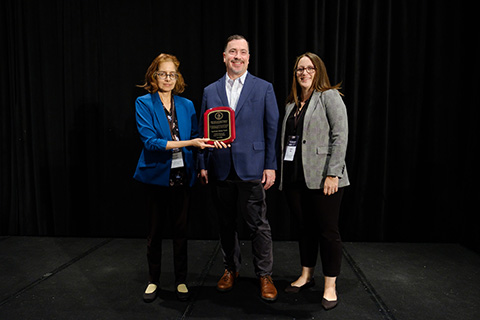
Hydrogen Production Technologies
Xingbo Liu, West Virginia University
This award recognizes Dr. Xingbo Liu and his team at West Virginia University for their work to demonstrate high-performing and durable reversible proton conducting solid oxide electrolysis button cells. The team recently demonstrated a cell achieving a current density of 1.46 A cm−2 at 1.3 V in the electrolysis mode for over 5,000 hours of continuous operation (40 vol% H2O) at 600°C with minimal degradation (1 mV/1,000 h). Notably, these cells are able to operate reversibly and demonstrate reasonable power densities in fuel cell mode.
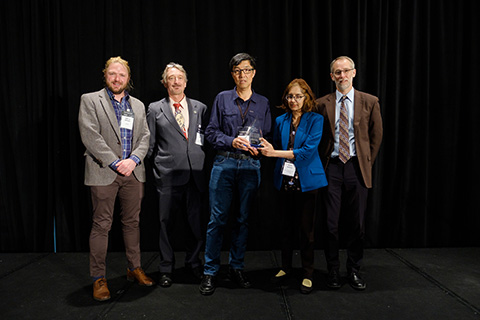
Fuel Cell Technologies
Rangachary Mukundan, Lawrence Berkeley National Laboratory
This award recognizes Dr. Rangachary Mukundan of Lawrence Berkeley National Laboratory (LBNL) for his outstanding leadership in developing accelerated stress test protocols (ASTs) as part of the Million Mile Fuel Cell Truck consortium. Long-haul heavy-duty trucks require more than 5X improvements in lifetime to achieve DOE's million mile target. Mukundan[HS1] formed and led both the AST working group and the international durability working group to develop an AST protocol for heavy-duty fuel cell membrane electrode assemblies. This critical step will help to guide the material and cell design of membrane electrode assemblies while reducing development time. Mukundan, who is currently a Senior Scientist of the Energy Conversion Group at LBNL but previously worked at Los Alamos National Laboratory, has made extensive contributions to fuel cells, electrolyzers, flow batteries, and sensors.
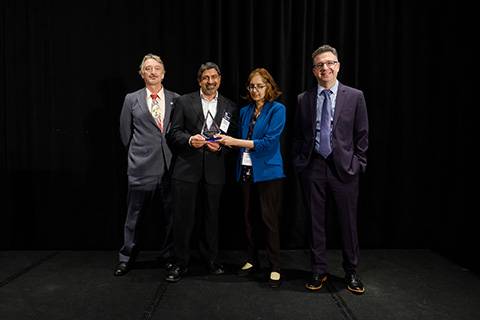
Adam Weber, Lawrence Berkeley National Laboratory
This award recognizes Dr. Adam Weber of Lawrence Berkeley National Laboratory (LBNL) for his outstanding leadership as the co-director of DOE's Million Mile Fuel Cell Truck consortium. Weber has been instrumental in organizing and leading the core team of five national laboratories and developing partnerships with industry, academia, and other national laboratories in an effort to overcome durability and efficiency challenges for proton exchange membrane fuel cells in heavy-duty applications. Weber is the Senior Staff Scientist of the Energy Conversion Group at LBNL and has made extensive contributions to the fuel cell, flow battery, carbon dioxide reduction, and other electrochemical device research communities, particularly through modeling and characterization of these various electrochemical devices.
Tommy Rockward, Los Alamos National Laboratory
This award recognizes Tommy Rockward of Los Alamos National Laboratory (LANL) for his exceptional leadership of LANL's workforce development initiatives. Tommy has been instrumental in mentoring over 100 students to provide opportunities for advanced degrees and top-level research in the area of hydrogen and fuel cells. His outstanding efforts promote workforce development and enable hydrogen and fuel cell jobs.
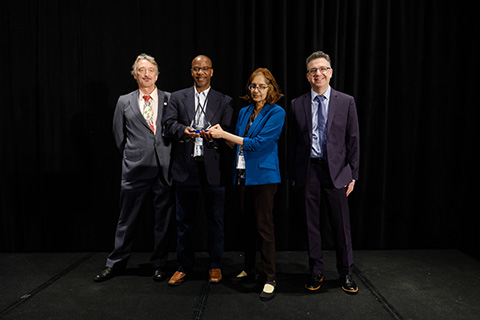
Systems Development and Integration
Uuganbayar Otgonbaatar and Robert Beaumont, Constellation Energy Generation, LLC
This award recognizes Dr. Uuganbayar Otgonbaatar, Mr. Robert Beaumont, and the entire project team at Constellation Energy Corporation for their outstanding work designing, installing, and demonstrating a system for the production of clean hydrogen at the Nine Mile Point Nuclear Station in Oswego, New York. The facility is the first of its kind in the United States to generate clean hydrogen using nuclear power. The system includes a 1.25 MW proton exchange membrane electrolyzer, manufactured by Nel Hydrogen, which can produce 560 kg per day of clean hydrogen utilizing the electricity generated by the nuclear plant. The clean hydrogen is used on site at the nuclear facility for plant operations.
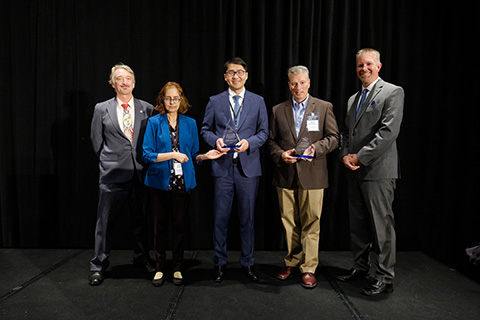
Jason Hanlin, Center for Transportation and the Environment
Jason Hanlin of the Center for Transportation and the Environment (CTE) is recognized for successfully leading the development and demonstration of a fleet of hydrogen fuel cell box trucks for operation. Fifteen fuel cell range-extender box trucks went into commercial service at UPS delivering parcels this year, lowering the emissions in the surrounding communities of Ontario, California. Other project accomplishments include operator, mechanic, and safety training; maintenance facility upgrades; and commissioning support for the Ontario hydrogen fueling station. The project team led by CTE includes UPS, Cummins [Hydrogenics], UES, Inc., and The University of Texas at Austin Center for Electromechanics.
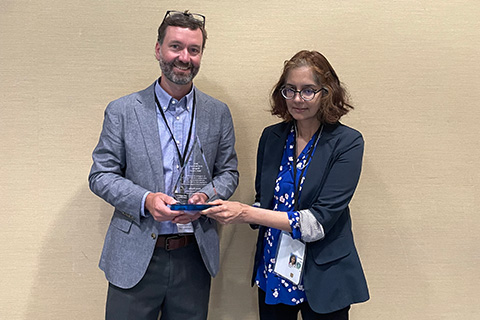
Systems Analysis
Tom Sykora, Krishna Reddi, Pradeep Vyawahare, Hao Cai, Amgad Elgowainy, and Michael Wang, Argonne National Laboratory
The Greenhouse gases, Regulated Emissions, and Energy use in Technologies (GREET) team at Argonne National Laboratory (ANL) is recognized for providing critical fast turnaround support to DOE on life cycle analysis to inform program strategy and for working tirelessly in 2022 to enhance the user-friendliness of the GREET model. Due to the technical rigor and hard work of the ANL team for decades, GREET is now globally recognized as a state-of-the-art tool for life cycle assessment and was recently cited in the Inflation Reduction Act to support implementation of the 45V Credit for Production of Clean Hydrogen.
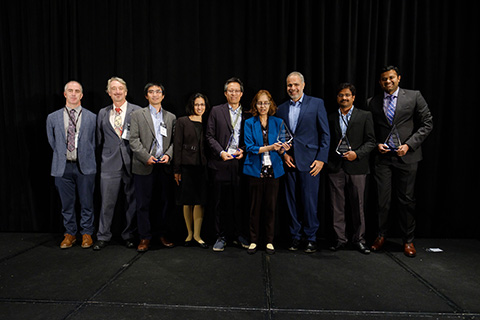
Safety, Codes and Standards
Sara Marxen, CSA Group
Sara Marxen of CSA Group is recognized for her outstanding leadership in the development of Canadian Standards Association and International Organization for Standardization standards, as well as her active participation in the greater regulations, codes, and standards community. Her detailed work has led to significant improvements in the quality of the hydrogen standards being developed.
